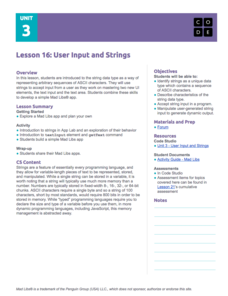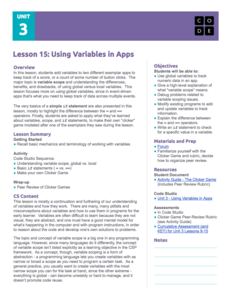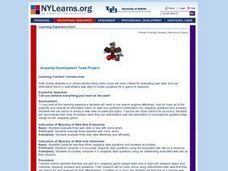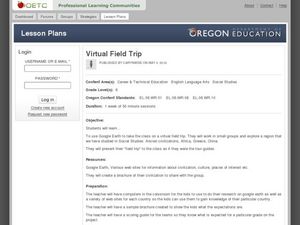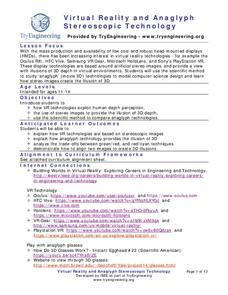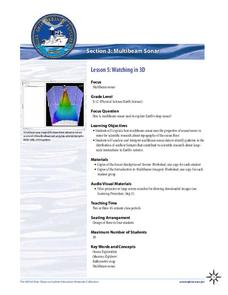Annenberg Foundation
America's History in the Making: Using Digital Technologies
How can digital technology of today link us to the events of the past? Scholars use technology to uncover the vast number of historical resources available in lesson 12 of a 22-part America's History in the Making series. Using databases...
NPR
Young And Brave Lesson Plan
Honor brave young women with a lesson that showcases 30 individuals who's achievements made a lasting impression on our country's history. Here, scholars randomly choose a person to examine from an interactive myseum exhibit then share...
Computer Science Unplugged
Battleships—Searching Algorithms
How does a computer perform a search in order to find data? The lesson begins with a demonstration on finding one number out of 15. Pairs then play three games of Battleship by using different search techniques. The lesson plan finishes...
TryEngineering
Arduino Blink Challenge
Who knew turning a light on and off could be so complicated? In the instructional activity, pupils use Arduino boards to learn about computer codes and programs. They program an Arduino to make a light turn on and off at certain time...
Code.org
User Input and Strings
Pupils learn to apply strings in computer science. They master two new user interface elements and also use string type data to represent ASCII characters. Finally, individuals create an app for Mad Libs in the eighth lesson of the series.
Code.org
Introduction to Arrays
How can you store lists in a computer program? The 16th installment of a 21-part unit introduces arrays as a way to store lists within a variable. Individuals program a list of their favorite things—adding interest to the activity.
NPR
Progressive Era Lesson Plan
The women working for equal rights in the early 20th century weren't a part of one large group; rather, they were members of dozens of small groups focused on social reform. Explore the ways groups in the Progressive Era like National...
Code.org
Using Variables in Apps
Investigate the benefits of using global variables. The seventh installment of a 21-part unit continues the study of variables from the previous lesson. Young computer scientists modify two existing apps by adding variables and learn how...
Code.org
Introduction to Data
Data, data everywhere. Challenge your class to begin thinking about data, the ways people collect information, and what we can learn from this data. Class members discuss sources of data and then individuals answer questions in the class...
Teach Engineering
Cell Membrane Structure and Function
Teach your class how to get out of a cell — or break in. The third installment in a seven-part series introduces the class to cell membranes and their functions. The lesson plan includes information to present to the class,...
Curated OER
Jeopardy Development Team Project
Students study the criteria for evaluating web sites and use information found in authoritative web sites to create questions for a game of Jeopardy. They evaluate three different web sites, some with minor errors and some with major...
Curated OER
Computer Security:
Young scholars watch a video on computer safety and then complete activity sheets about the characters in the video. In this safety lesson plan, students are provided with the worksheets.
Curated OER
Time for Technology Glyphs
Students create a time for technology glyph using Kidpix4. They complete a circle map on things they like to do on while on the computer and write about their favorite thing to do while on a computer.
Curated OER
Teaching Writing on a Computer
Walk your young writers through the basics of typing and saving their work on a computer. Step-by-step instructions not only help you prepare classroom computers for this exercise but also provide specific instructions so that class...
Curated OER
Virtual Field Trip
Are we there yet? Young trip planners learn about their state and plan a trip. They will select sites to see in three cities in their state, and record associated costs in a spreadsheet. While this was originally designed as a...
Curated OER
Recipes for Foreign Foods
Upper graders choose a foreign country to research. They use the computer to locate three recipes from the country of their choice. Next, they link the information in each recipe to what they know about nutrition and food. Note: This...
Curated OER
Character Webbing- Romeo and Juliet
Pupils use technology to be engaged in an Language Arts assignment. The play of Romeo and Juliet is viewed on the computer and all skills related to its viewing are accomplished at the computer station.
Curated OER
The BEAM Project: Building Efficient Architectural Models
Technology or engineering teams are given a task to design, construct, and test the efficiency of a structure that will foster an even temperature throughout an entire sunny day. Intended as a long-term project, pupils research, plan,...
Carnegie Mellon University
Understanding Electricity Mix Tradeoffs
Use the accompanying presentation and colorful technology sheets to introduce your class to the 10 different energy technologies. Connect kids to an interactive computer tool that allows them to combine different types of power...
West Contra Costa Unified School District
Correlation and Line of Best Fit
Computers are useful for more than just surfing the Internet. Pupils first investigate scatter plots and estimate correlation coefficients. Next, they use Microsoft Excel to create scatter plots and determine correlation coefficients and...
Curated OER
Pen Pals
Students collect bird count data at their sites, and share and compare the data collected from two different schoolyards using computer technology.
Code.org
Events Unplugged
Introduce event-driven programming. Young computer scientists learn the meaning of event-driven programming and how it is different from previous styles of programming. They play a card game to simulate the challenges that occur in this...
Institute of Electrical and Electronics Engineers
Virtual Reality and Anaglyph Stereoscopic Technology
Experiment with 3-D glasses to learn about stereo images and virtual reality. Scholars look at various images to determine if green/red or red/cyan glasses are preferable. They determine distances between images using the 3-D glasses and...
NOAA
Watching in 3D
Bring the ocean floor to life! Earth science scholars discover the process of deep sea mapping in the third installment in a series of five lessons about ocean exploration. The teacher's guide includes helpful resources, worksheets, and...






